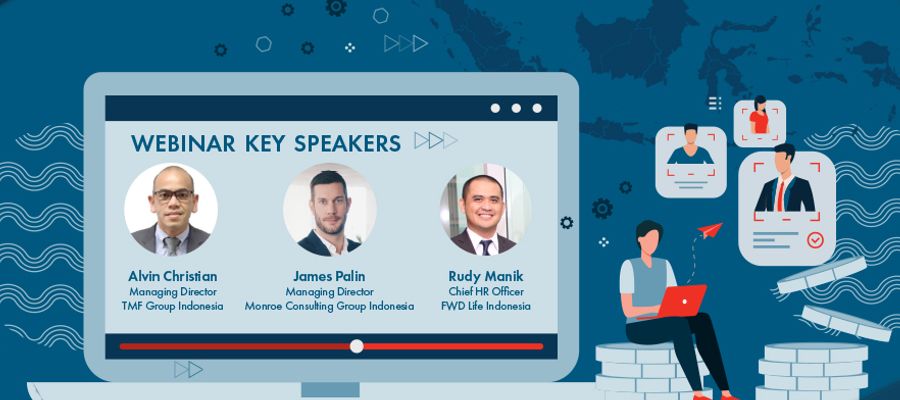Monroe Consulting Group hosted another webinar, Omnibus Law: Predicting The Future Of Investment and Hiring, on Wednesday 2nd of December. With 200 registered participants the event was a great success and provided attendees with useful information about the omnibus law on job creation that The Indonesian House of Representatives passed on October 5th 2020.
The Omnibus Law on Job Creation marks a significant improvement in Indonesia’s business climate and a step forward for labour market flexibility, which should, over time, improve the country’s international competitiveness. The bill is aimed at unravelling Indonesia's complex web of business, labour and environmental laws to attract investment and stimulate the economy. Indonesia’s President Joko Widodo mentioned in an interview with BBC Indonesia, that the main reason the law came to pass was to “simplify the licensing and bureaucracy [process]”. He further stated that “we want speed, so a harmonisation of law is needed to create speedy services, speedy policymaking so that Indonesia would be faster to respond to every world change."
Indonesia's ranking in the World Bank's Ease of Doing Business index has significantly improved in the past five years, but it remained stagnant at 73rd in 2019. In addition, COVID has brought a greater challenge to theIndonesian economy as it dipped into recession in Q3and unemployment numbers increased. The government believes that the omnibus law will help improve Indonesia’s economy and labour market. However, there is still some uncertainty surrounding the bill, and it raises questions on how the law will change Indonesia’s business landscape.
Monroe Consulting Group andTMF groupjoin forces in the hopes of providing some key insight into this issue through their collaborated webinar event and answer some of the pertaining questions to the omnibus law from an investment and hiring perspective.
One of the key speakers, Alvin Christian, Managing Director at TMF Group Indonesia starts off the webinar discussing the impact the law has on investment in Indonesia and what major changes the law has created to help simplify Indonesia’s complex business regulations. One of the major changes is the 20 business sectors that were previously closed for foreign investors, a few have now been opened with only 6 that remained closed. The notable sector industries that previously closed and are now open are (i) operators of terminal for passenger land transportation, (ii) air navigation service, and (iii) wine industry. Alvin further mentioned other changes that the law brings such as simplifying business licences and changes in tax that will hopefully appeal to foreign investors entering the Indonesian market.
From a hiring perspective, James Palin, Managing Director at Monroe Consulting Group Indonesia discusses with the viewers, why the omnibus law is a game changer for jobs seekers and employers, especially international companies who are looking to set up their business in Indonesia. James says that “When you look at International companies who are looking to set up their branch offices in south East Asia, they are not looking at Indonesia but instead their neighbouring countries. Indonesia has been viewed as a high-risk country by global multinational companies and one of the barriers is their complex web of regulations and inflexible hiring laws”. James further explained how the law will bring a positive change for the labour market and hopefully help to reduce the high number of unemployment due to COVID. The major change that the law brings is that contracting for white collar employees is now legal. James further stated that “Companies who previously wouldn’t be able to hire based on risk and cost will now be able to lead bigger projects that can be accurately costed and more importantly, run legally”.
Lastly, Rudy Manik, Chief HR office at FWD Life Indonesia, gave a more detailed breakdown of what the law has changed for the following sectors: foreign workers, remuneration, working hours, severance package, social security, termination process, outsourcing and job training. He further explained how HR practitioners can leverage the changes that the law brings and one of the key points he mentioned was the future of work -contingent labour, which is aimed at the gig economy. Rudy says “With the new law there is a potential that it will appeal to a larger number of millennials who are not interested in permanent employment”. Another change that the law will bring is the competitiveness and attractiveness of permanent employment. With contract employment now a legal option, the demand for better quality candidates of permanent employees will be higher. Rudy ends his presentation saying that we are still waiting for some regulations to be finalized before the law can be implemented but he says that so far the law will bring positive change for the labour market in Indonesia.
The webinar ended with a Q&A session where attendees could submit questions that the panellist would answer live or directly via chat. There were some interesting questions being asked and a few foreigners taking interest in some of the changes being made to ease business regulations.
Monroe Consulting Group offers creative solutions to workforce challenges and has partnered with various multinational and local companies to cultivate careers and build businesses across all industries, including consumer goods, health, industrial, professional, technology and staffing. If you missed out on our webinar you can view it here:Watch Omnibus Law Webinar
If you are interested in consulting with us on how the omnibus law will impact your company hiring plan next year, you can contact us at:
T: +62 21 2940 0040
E: indonesia@monroeconsulting.com

